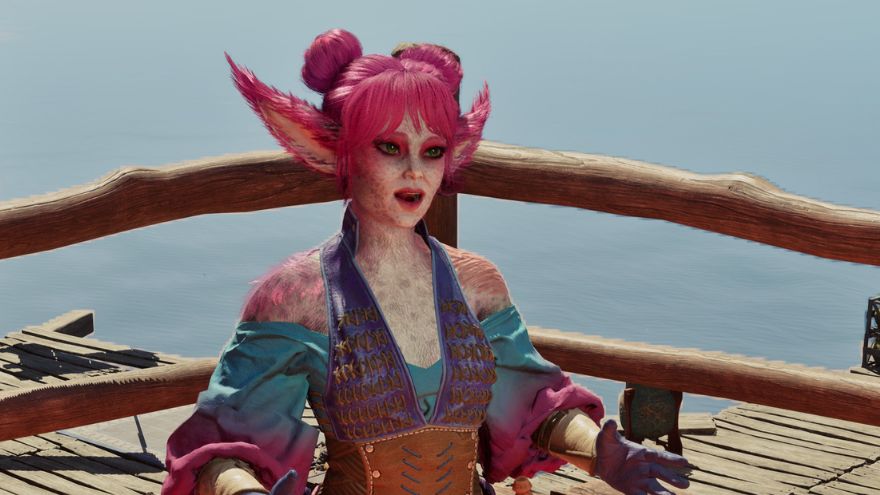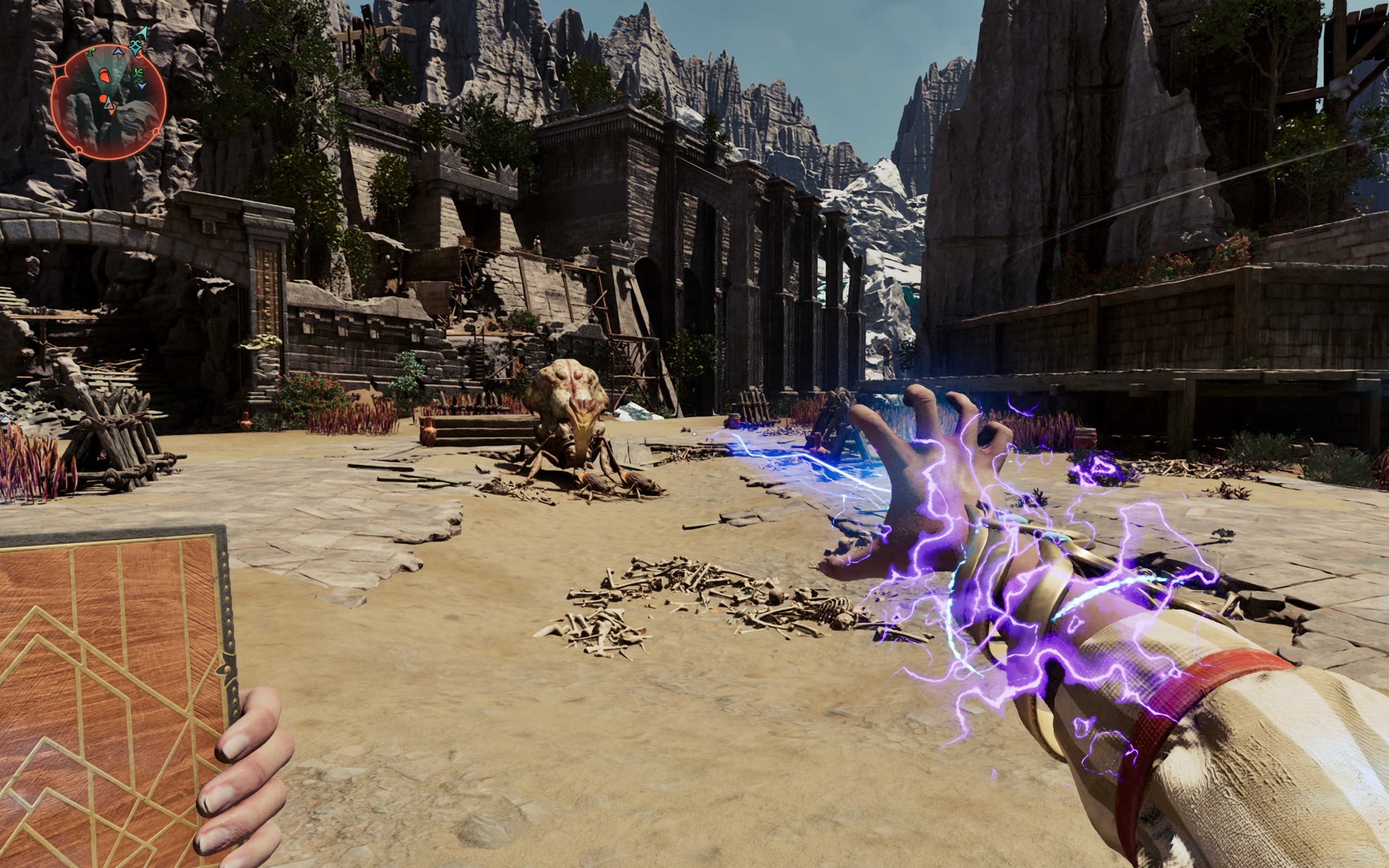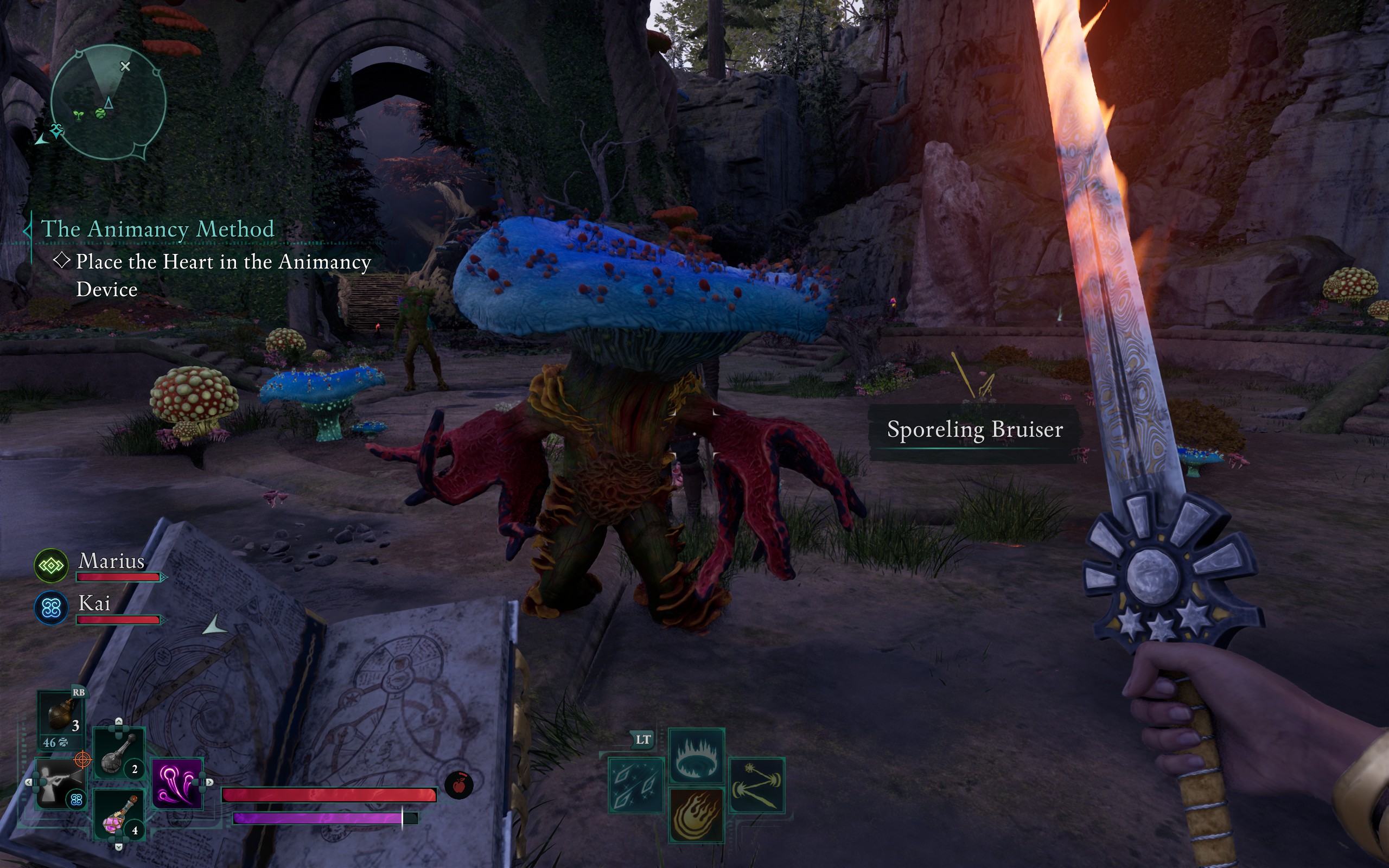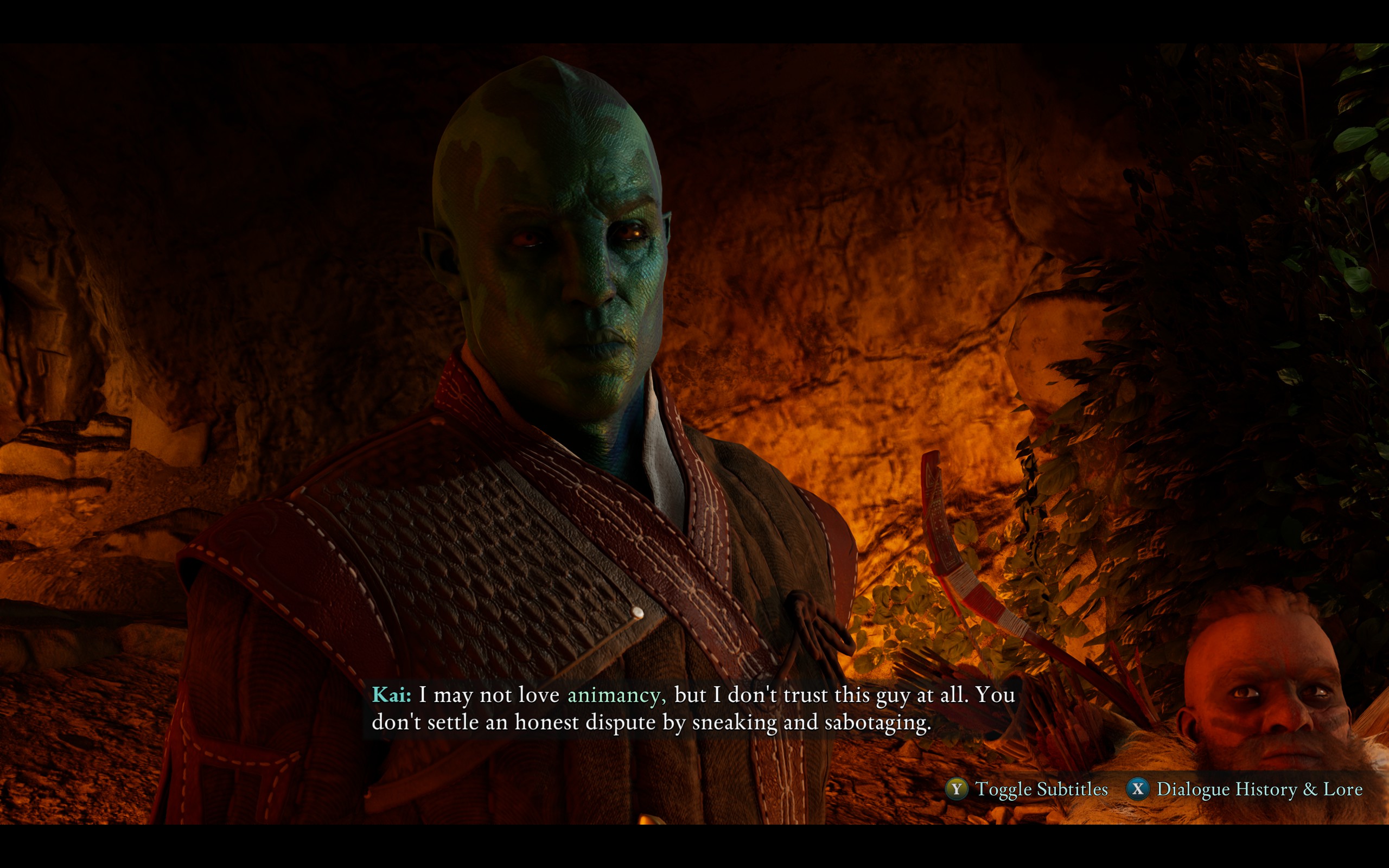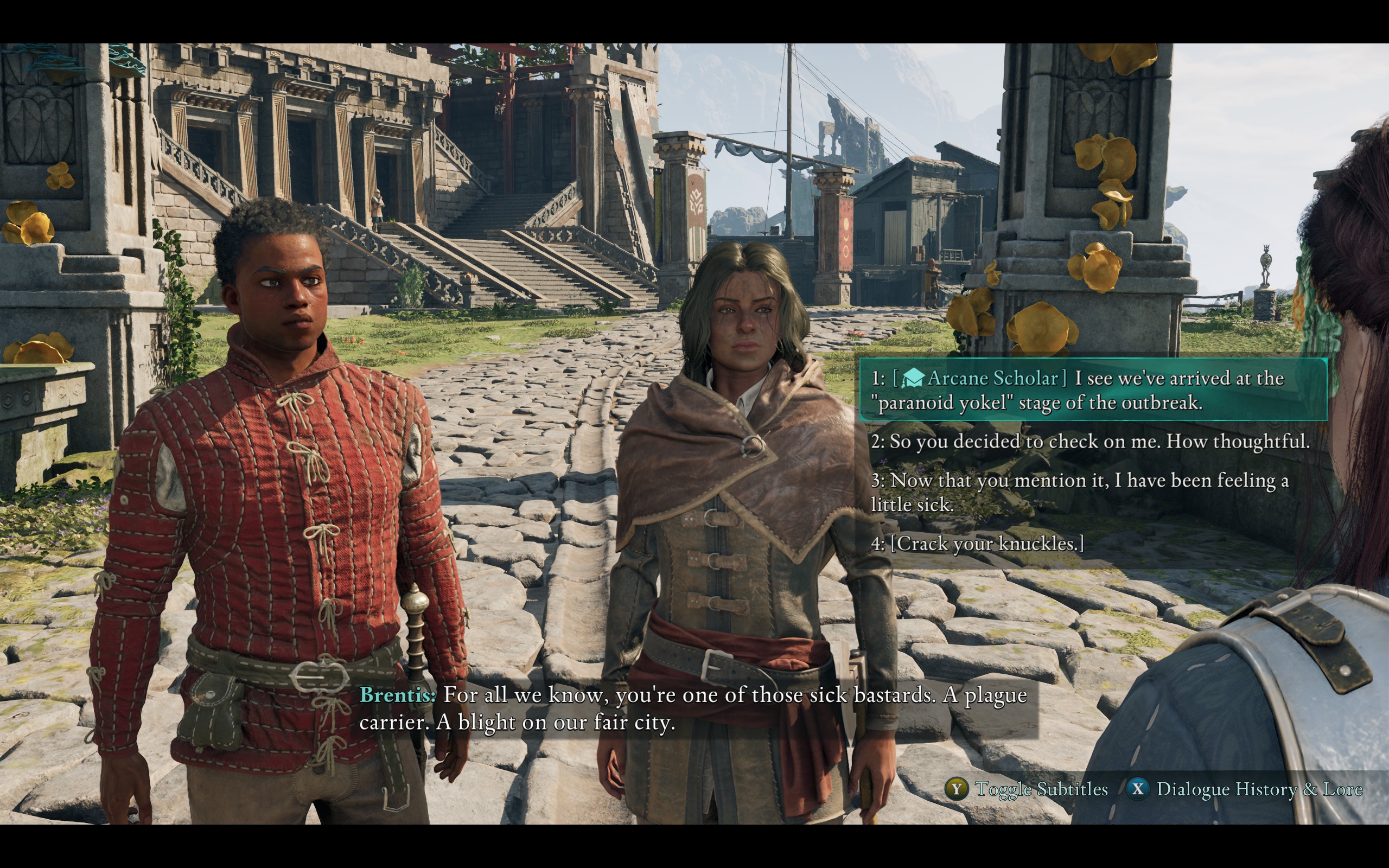Our Verdict
Bigger than it first appears, Avowed is an engrossing and gorgeous action-RPG set in one of the most engaging fantasy worlds going, though it lacks the complex systems of its most beloved contemporaries.
PC Gamer's got your back
What is it? A first-person fantasy action RPG written with typical Obsidian flair.
Release date Feb 18, 2025
Expect to pay $70/£60
Developer Obsidian Entertainment
Publisher Xbox Game Studios
Reviewed on RTX 3060 (laptop), Ryzen 5 5600H, 16GB RAM
Steam Deck TBA
Link Official site
In mid-2023, a few prophetic minds warned that the imminent launch of Baldur's Gate 3 was going to raise expectations for future RPGs to unrealistic heights. Now, in early 2025, I'm here to say that, sadly, they were right: I'm compelled to point out right off the bat that Avowed is not Baldur's Gate 3, nor is it Stalker 2, nor is it Kingdom Come: Deliverance 2. It's not Fallout: New Vegas, either. No, it's a much more old-fashioned kind of thing.
Avowed is undeniably a product of the studio responsible for The Outer Worlds and—most relevant in this case—Pillars of Eternity. It spins a gripping fantasy yarn, balancing existential severity with arch humour, while retaining that most enduring and fascinating Obsidian quirk: this is an admirably flawed achievement. It succeeds as an action game, it excels as a choice-based narrative game, but with the criteria determining what makes a brilliant RPG having so dramatically shifted of late, it doesn’t feel like a standout RPG in 2025. Its world, though beautiful, is simply too static—not as malleable or reactive as some of its contemporaries, nor even the classics it recalls.
I am a Godlike envoy of the Aedyr emperor, sent to the notoriously dangerous Living Lands to investigate the Dreamscourge. This "soul plague" sends people and animals mad while blighting them with actually-quite-stylish technicolour body fungi. The virus is spreading fast, so my nameless, voiceless and fully-customisable envoy must put a nip in its fungal bud before it spreads to the Aedyr empire proper.
As an envoy for a powerful empire hoping to claim dominance over the Living Lands, I’m both hated and feared by the races who have planted flags across the island. But that's not the only special thing about me: I'm also a Godlike, which means I’m blessed by a god, boast gnarly divine abilities, and am also marked by fungi signaling my connection to divinity, though without the "going mad" component. I'm also, importantly, harangued by strange voices in my dreams. The character creator is complete with all the lip and ear-size sliders you could want, and if the fungi creeps you out (like some members of the PC Gamer team) it can be toggled off entirely.
As the narrative unfolds, Avowed evolves from a fantasy-flavoured political potboiler into something verging on Dantean: there are ancient gods, forgotten races, and many bewildering philosophical rants. I begin as a mere messenger, but things inevitably get way out of hand, as they surely must in a game that obliquely traverses a lot of thematic terrain—colonialism, encroaching totalitarianism, environmental disaster—without ever feeling heavyhanded. Obsidian is good at writing fantasy. With Avowed, they have a world already substantiated across two meaty CRPGs, and people who played the Pillars of Eternity games will be amply rewarded with callbacks and lore. I for one loved reacquainting with the weirdly cute Xaurips and Sporelings (before killing them).
As unwieldy as the setup may seem on paper, Avowed maintains an admirable focus during its 50-odd hours. I never lost track of what was happening. And I thought I would, given this is a game with a dynamic glossary accessible mid-conversation, à la Final Fantasy 16. Across a handful of discrete "open zones," Obsidian weaves a compact critical path between a wealth of fascinating sidequests that, while ostensibly optional, feel like the substance of the game.
Eora mission
Like in all the best RPGs, it's not the world you hope to save that matters, but the frivolous jobs you do along the way. I remember a dubious situation between a Paradis woman and her weirdly adoring Xaurip admirers more vividly than any of the major plot beats. Likewise, visiting my companion Marius's vanquished home village, crouched in the shadow of a giant volcano, was more impactful than finally confronting the fascistic antagonist for the first time. I was more proud of saving a brothel in Paradis than I was of deciding to have mercy on a villain who I really ought to have, in retrospect, killed. These sidequests shouldn’t be missed, and in truth cannot be, because focusing on the main quest at the expense of the XP and steady upgrade materials they provide probably won’t be feasible for most players.
Keep up to date with the most important stories and the best deals, as picked by the PC Gamer team.
It’s common to turn a corner, or mount a crest, and bear witness to a perfectly framed vista that would have looked like overly ambitious concept art 10 years ago.
Marius is one of four companions, and like the others, he's familiar: a diminutive foul-mouthed tough guy with a golden heart. Early favourite Kai is the sardonic but sincere Garrus-like (voiced by Brandon Keener of Garrus fame, coincidentally), while a later character—it may be a spoiler to say too much—is the sassy sexual innuendo enjoyer. And don't fear: there's a bookish, determinedly humourless companion too.
You've met these people before in other RPGs but they're nevertheless well-drawn, with stories and motivations of their own, and an almost unbelievable reservoir of random stuff to say at the campfire sites where I can lick my wounds, improve my gear, and mercilessly question them. Archetypal though they are, they feel alive.
Adventuring with this gaggle across the varied regions of the Living Lands is gratifying mainly because Avowed is a stunning game to look at. Each zone carries a distinct grandeur of its own, and whoever designed these landscapes did so with the sensibility of a cinematographer. It’s common to turn a corner, or mount a crest, and bear witness to a perfectly framed vista that would have looked like overly ambitious concept art 10 years ago. The discrete maps are dense with points of interest, whether caverns chiselling deep into the earth or ruins full of spoils. They don’t feel like real spaces, but that’s not because they feel like videogame spaces: they feel like dreamlike fantasy worlds dreamt up by paperback fantasy bonglords.
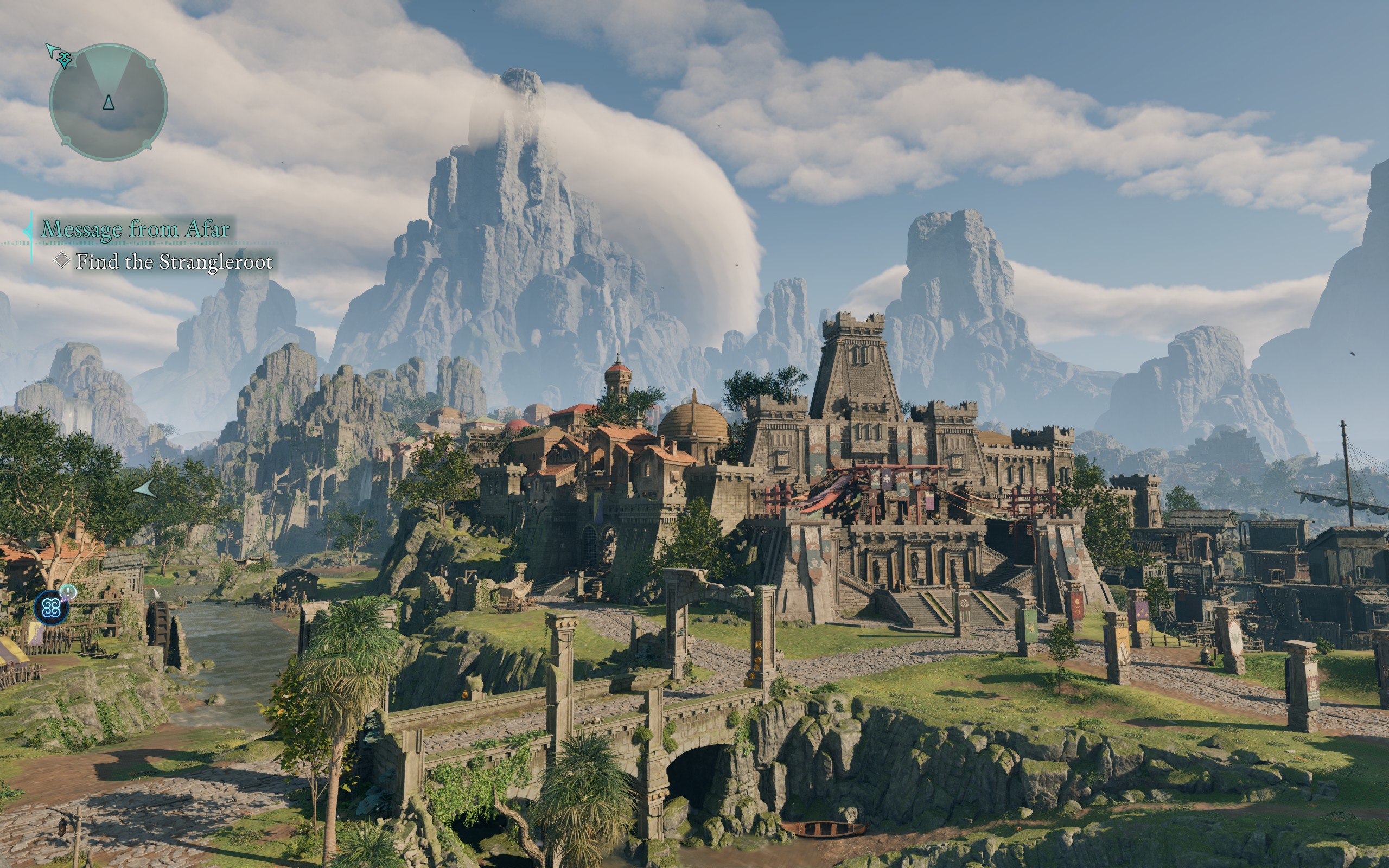
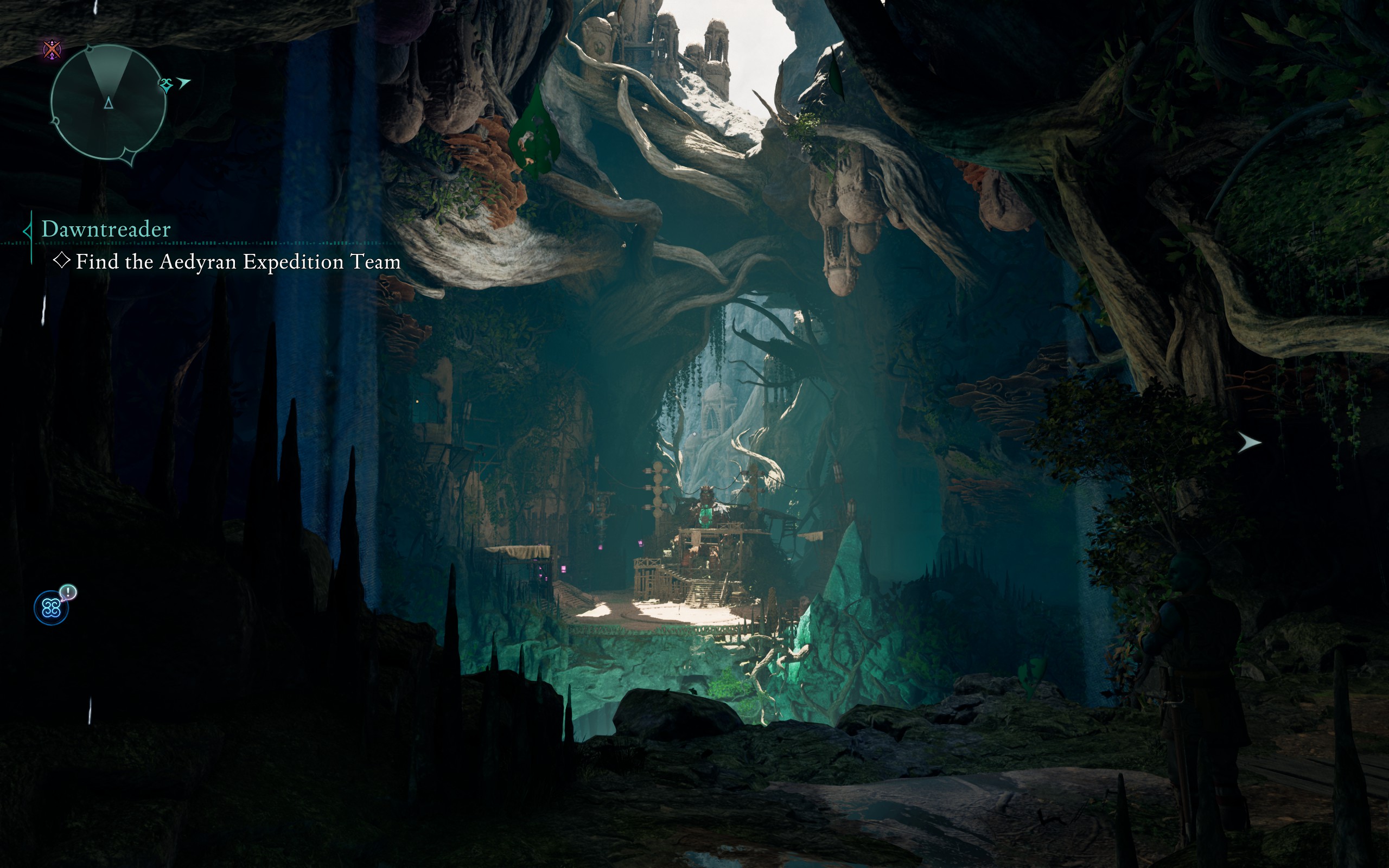
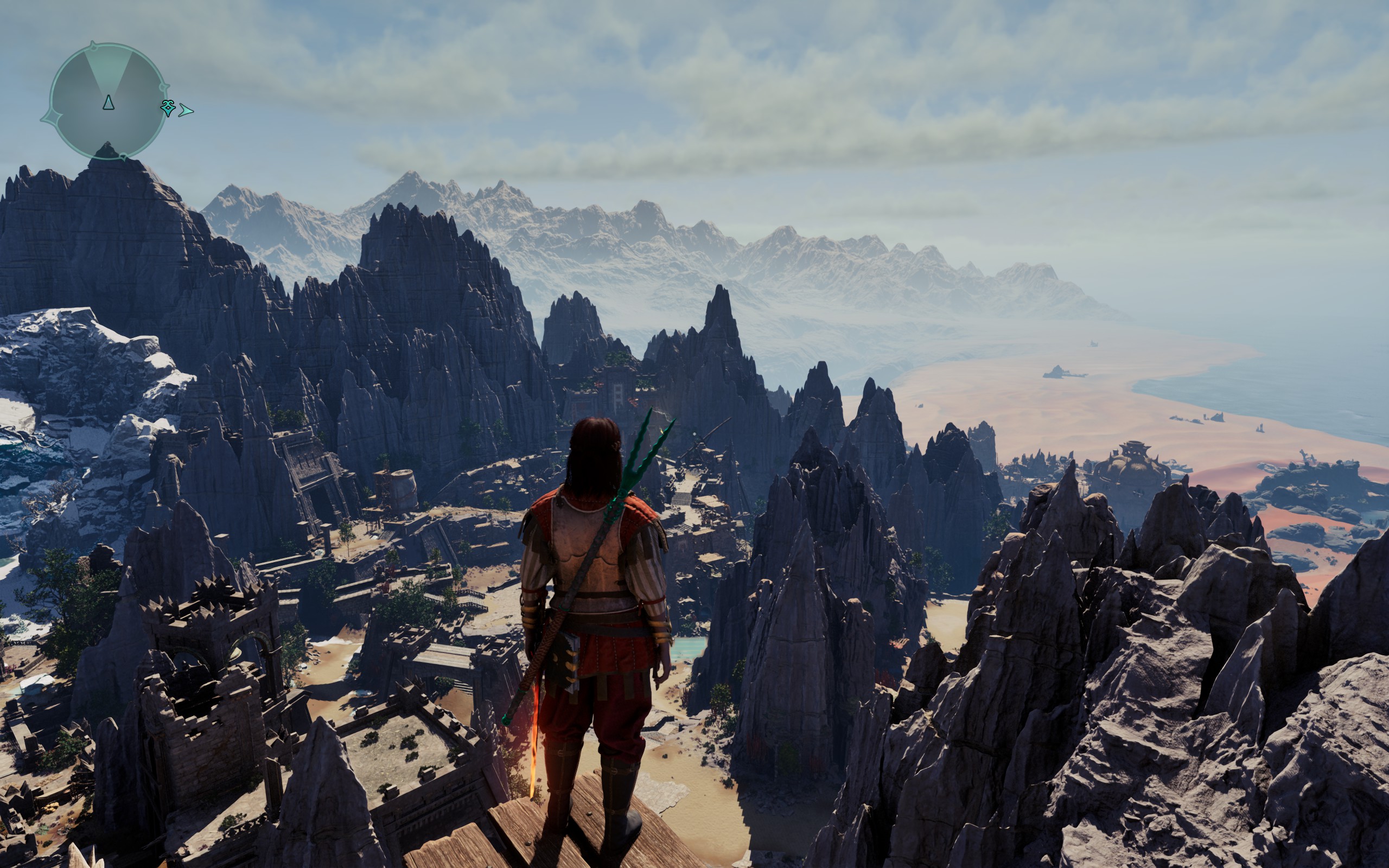
Avowed leaves a great first impression. Those first 10 hours I spent in the sprawling city of Paradis and the wider Dawnshore region, learning about the Dreamscourge and life under the Aedyr colonisers, exploring surprisingly deep dungeons, shooting the shit with Kai, and making enemies with the local strongmen, put me in mind of the feeling of playing New Vegas or Oblivion for the first time, but better. Some of the missable sidequests, particularly in the first area, take me places other studios would want to frontload in the opening hours of the main quest. Avowed felt like a sumptuous embarrassment of riches.
But while this is a very good game, with time I came to understand that its ambitions are a touch more humble than some recent genre heavyweights. I realised that it might be more flattering to think of Avowed as a choice-based narrative-driven action game. Or, as a certain kind of simplified blockbuster RPG that is fast receding in the medium’s rearview mirror.
Doom infernal
Let's talk about the fighting first. Avowed is surprisingly combat heavy, especially in its second half. It’s possible to play with the usual array of melee weapons—swords, axes, spears, maces—but you’d be missing out on a lot if you’re not playing Avowed like 21st century Hexen, mixing powerful ranged attacks with down-and-dirty close quarters hacking. Every one-handed weapon can be dual-wielded, so I normally roamed with a grimoire in one hand and a fire-enchanted sword in the other, raining down elemental area of effect attacks on bears, bugs and lizardmen before sprinting in to hack away. For the magic averse, it's also possible to muscle about with a mace in one hand and a pistol in the other, for example.
The grimoire is fun for all the flashing lights and mystical effects it conjures, but if magical pew-pew is more your bag there are wands too. Pistols and arquebuses are present too with all the slow reloading that entails, and so are bows. These conventional weapons have unlimited ammo, probably for magical reasons, but grimoires need essence (basically mana, in this context). Whichever route is taken, high mobility is key, standing still is death, and my envoy’s impressive parkour abilities proved useful when manoeuvring around the hordes.
I can’t attack anyone at will and suffer the consequences, though the narrative stages ample opportunities for me to kill or have mercy.
There are classes and backgrounds to choose from, but all skill trees—fighter, ranger, wizard, and godlike—are available to all classes, and I ended up with a fully blended build without feeling disadvantaged for not specialising. I can't change the gear used by my companions, but they steadily accrue special attacks I can trigger at any time. My crew is pretty good at using these specials themselves, but they're close to useless when it comes to moment-to-moment combat, except when I revisit areas I'm way overpowered for.
Each quest has a difficulty ranking, not based on my level but on the power of the weapons and gear I'm using. The system is pretty vague: while gear is graded along typical RPG lines, I usually had to mix-and-match a bunch before a three-skull difficulty ranking de-escalated to two, mostly blindly, because there aren't any Destiny-style numbers to crunch. Upgrading gear is essential, because finding viable weapons is rare and usually relegated to sidequests or off-the-beaten path destinations. In the early game I found a unique one-handed fire sword that I went on to use right until the end, mostly because I can toggle between two loadouts on the fly, swapping fire for an ice mace and a shock-focused grimoire.
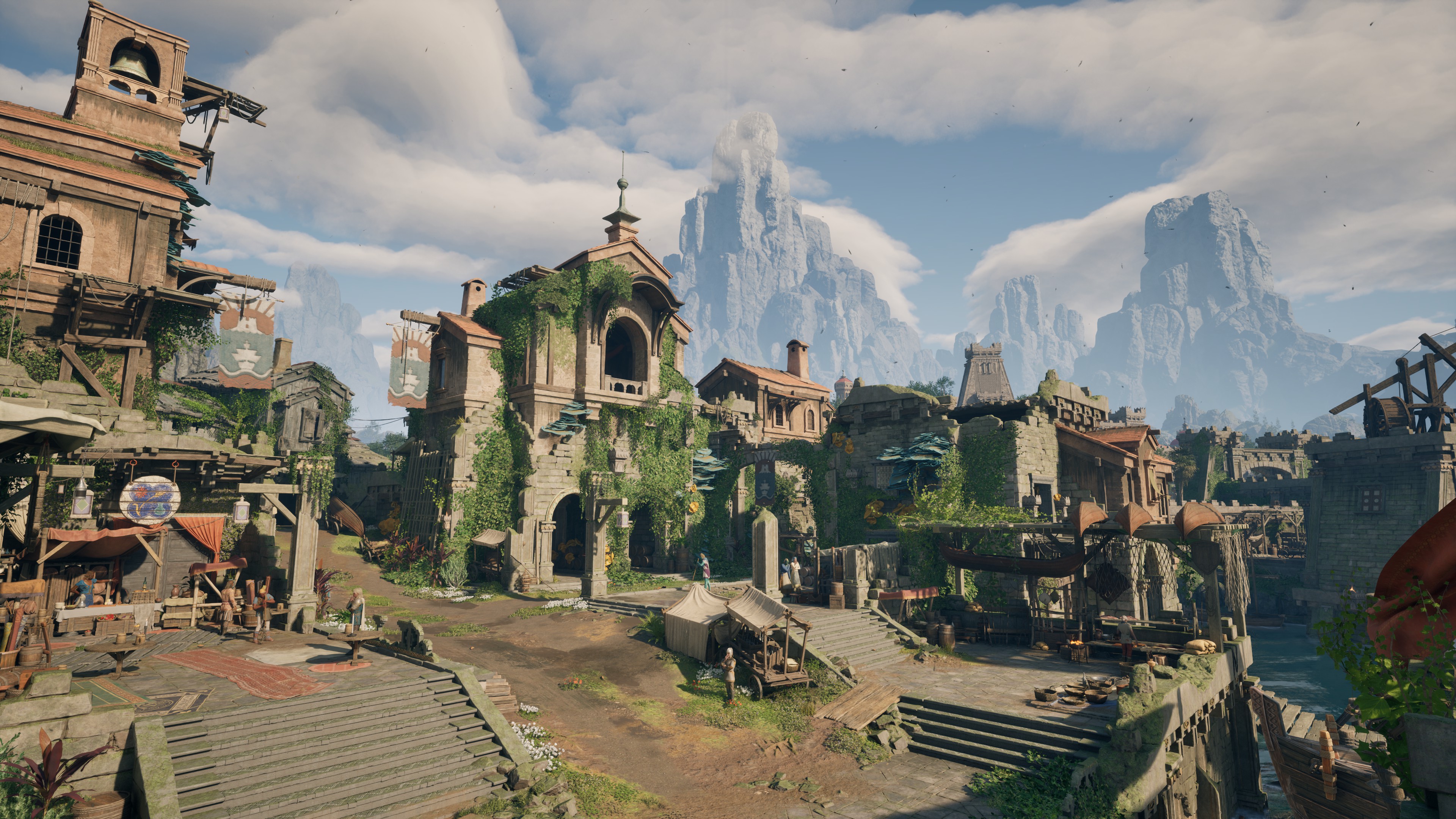
Check out our in-depth performance test for more details on how the game runs from our expert hardware team. We've tested Avowed on multiple devices, and discovered the best graphics settings to use to make your adventure as smooth and sumptuous as possible.
I don’t think Avowed’s combat could sustain my attention over the course of a linear, 15-hour action game, but as one of the main components in a story-led, exploration-rewarding RPG, it’s a lot more fun than I had dared hope for.
Performance was a little shaky on my increasingly long-in-the-tooth gaming laptop. With an RTX 3060, Ryzen 5600H and 16GB RAM, I obviously had no chance of smoothly running raytracing, but even at 1080p and low settings the framerate frequently dropped down to the 30s and 40s when I was in busy areas. The good news is that even at low settings Avowed is gorgeous, though low-quality shadows were a little over-obvious in places, and distant reflective surfaces acquire a weird opaque texture.
Immersive simple
But Avowed isn’t just a first-person action game, and after a while the artifice of its RPG systems started to show. These limits first became apparent when I, a lowly thief, realised I can rob people blind with no consequences at all. It’s possible to just enter some public figure's house, have a look around, open their chests and lockboxes, rob them of their coins, and the worst I’ll receive is a mild scolding.
When I’m not in conversation with someone, that someone forgets that I’m there. Nothing happens in this world unless I’m invited to make it happen or I'm bearing witness to it. This doesn’t make Avowed bad—I loved it—but it’s symptomatic of one area where it falls short compared to its contemporaries, not to mention the first-person Bethesda games it’s clearly modelled on. I can’t attack anyone at will and suffer the consequences (though the narrative stages ample opportunities for me to kill or have mercy). Likewise, while stealth is an option, it’s usually just a means to get an upper hand on a particular foe. Once I’ve attacked—whether from cover or using an invisibility spell—every baddie in the vicinity knows I’m there.
Where agency exists it’s in the conversation trees, and Obsidian makes good in this regard. As in Pillars of Eternity, usually my important choices are between two undesirable outcomes, or between lesser and greater evils. Moral ambiguity usually amounts to whether something bad will happen now, or whether it might happen at a more severe scale later. Decisions culminate in fun ways, especially towards the end where sidequests and the critical path cleverly intersect. Nevertheless, it all builds towards a climax that, while satisfying, loses some of the ambiguity that seems to define the series.
It’s the choices that don’t matter a lot that I really enjoyed: Avowed let me wave my snark flag at high mast, and it’s possible to be very cheeky during otherwise very stern occasions, which always made me laugh. I can be an arsehole, I can be flippant, I can speak with sagacity or well-meaningly, or I can safely opt for the answer that suits the background I chose at the beginning of the game. It’s possible to build a certain kind of envoy, even if, in the end, all it amounts to is guided head canon.
Systems shock
Avowed arrives at a weird and exciting time for RPGs. Baldur's Gate 3, Stalker 2, Kingdom Come Deliverance 2—heck, let's include Elden Ring as well—have all demonstrated that some amount of friction, whether it be difficulty, complexity or both, is welcome. Maybe even expected.
Avowed is a better RPG than Dragon Age: The Veilguard in almost every meaningful way, ranging from the meandering depth of its companion conversations through to the nuance of its worldbuilding and its willingness to get extremely dark at times. But when I look at them side-by-side I see RPGs made for audiences at scale, at a time when RPGs made for dorks and weirdos are having much more success. I really hoped that Avowed would remove the blockbuster guardrails the way recent genre heavyweights have. Obsidian knows how to do this and is among the best to have done it. Avowed is smart, but it’s not reactive. It’s not breakable. It’s not excitingly pliant, like some of Obsidian's finest.
Perhaps that's not the kind of game Avowed wants to be; it definitely succeeds on the somewhat humbler terms of a narrative-driven action RPG with memorable characters, a gorgeous world, and really fun combat. Just imagine if one day, these separate Obsidian tracks—spicy, reactive CRPGs and sumptuous first-person narrative adventures—perfectly intersect.
Bigger than it first appears, Avowed is an engrossing and gorgeous action-RPG set in one of the most engaging fantasy worlds going, though it lacks the complex systems of its most beloved contemporaries.

Shaun Prescott is the Australian editor of PC Gamer. With over ten years experience covering the games industry, his work has appeared on GamesRadar+, TechRadar, The Guardian, PLAY Magazine, the Sydney Morning Herald, and more. Specific interests include indie games, obscure Metroidvanias, speedrunning, experimental games and FPSs. He thinks Lulu by Metallica and Lou Reed is an all-time classic that will receive its due critical reappraisal one day.
